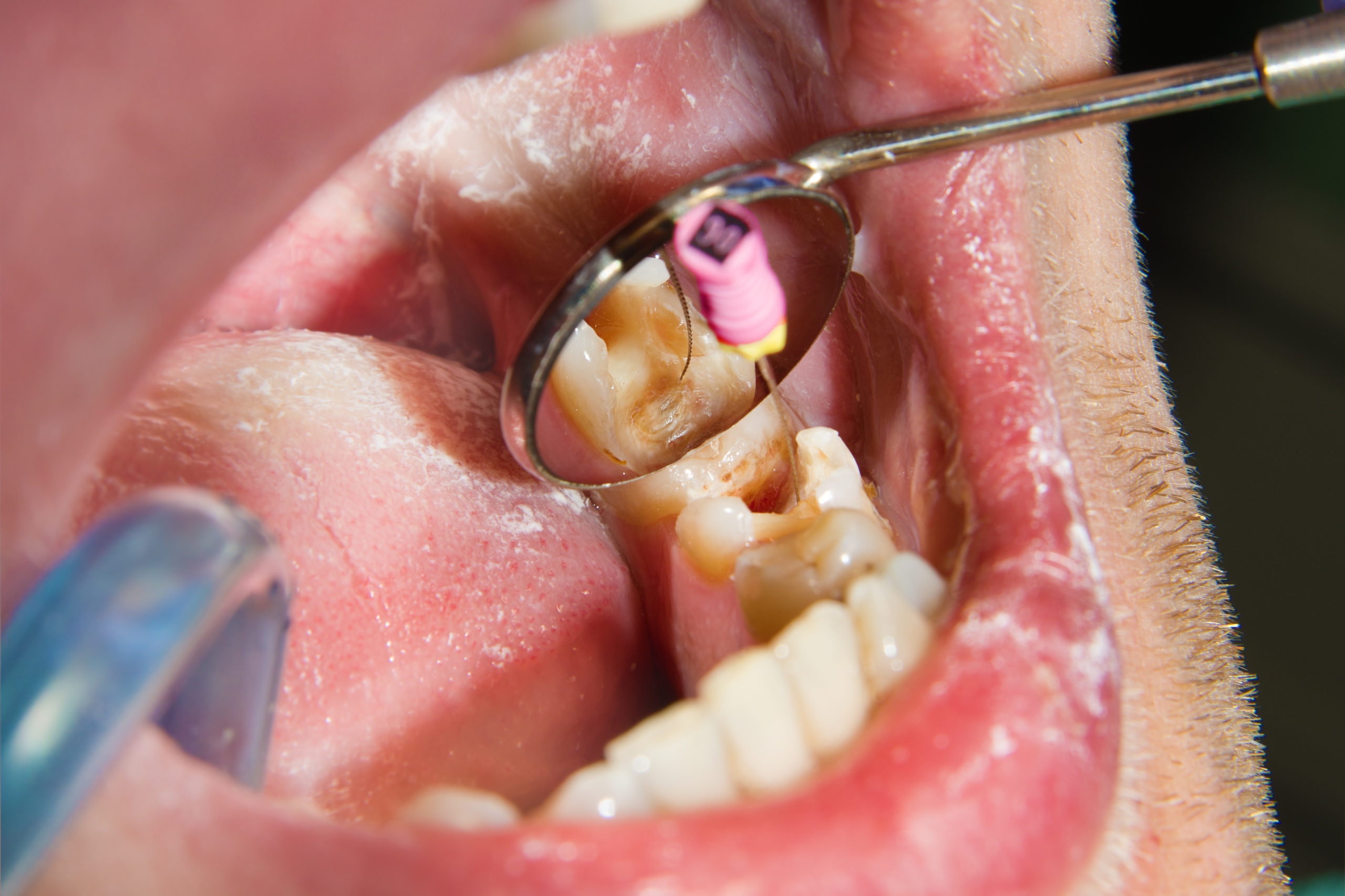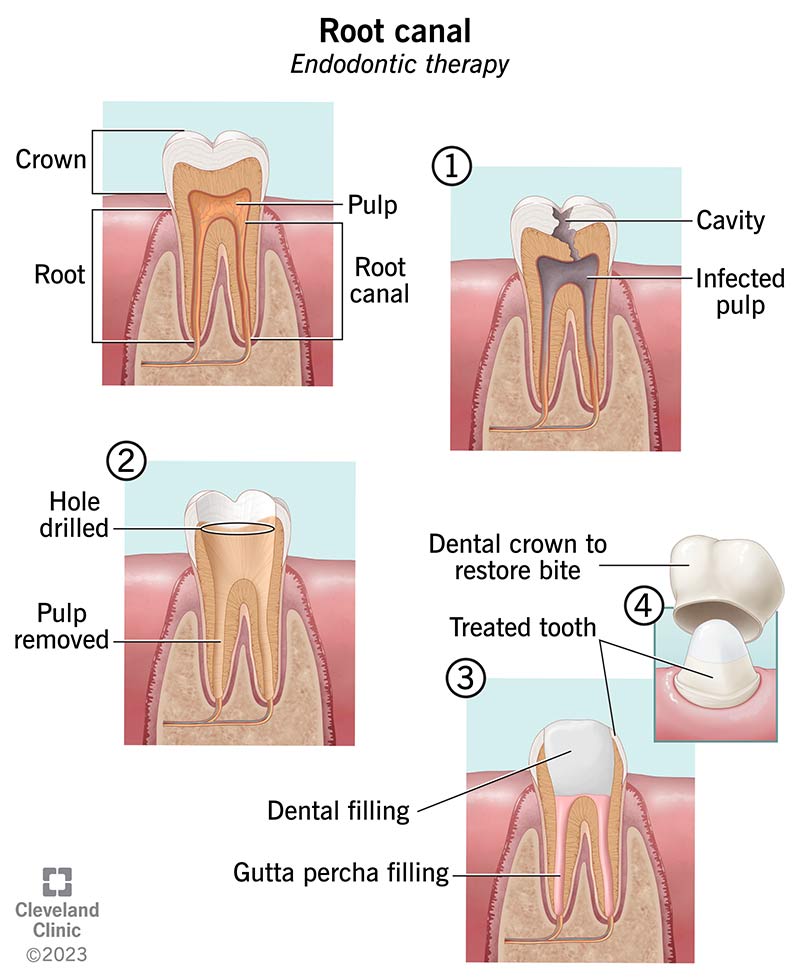A root canal treatment can last a lifetime with proper care and maintenance. Root canals aim to preserve the tooth and can be successful long-term solutions.
Root canals are essential dental procedures that effectively treat tooth infections, allowing the tooth to function normally for many years. While occasionally a re-treatment may be necessary if the tooth becomes reinjected, in most cases, a root canal can last a lifetime.
By addressing the root cause of the issue, root canals provide a durable solution that can help preserve your natural tooth for the long term. Proper oral hygiene practices and regular dental check-ups can further enhance the longevity of a root canal treatment, ensuring the health and stability of the treated tooth for years to come.

Credit: www.creekviewdental.com
The Lifespan Of A Root Canal
Root canal treatments are often successful in preserving teeth for a lifetime. Factors such as proper tooth restoration and oral hygiene play a crucial role in the longevity of a root canal. Additionally, the success rates of root canals are high, with many treated teeth functioning normally for many years. However, in some cases, a tooth may require retreatment if re-infection occurs. It’s important for patients to understand that while root canals can last a lifetime, regular dental check-ups and proper care are essential for maintaining the health of the treated tooth.

Credit: my.clevelandclinic.org
Before The Procedure
Root canals are recommended to help preserve the tooth and can often last a lifetime. In most cases, a root canal treatment will last a lifetime. Occasionally, a tooth may become reinfected, requiring a second root canal or endodontic re-treatment. The benefits of getting root canal therapy can last a lifetime, but some patients might need additional treatments in the future. Factors that impact the longevity of root canals include the need for retreatment after a few years and the success rate of the treatment. It’s important to consult with a dentist for personalized advice on root canal treatments.
The Procedure Explained
| Root Canal Longevity: |
| Root canal treatment can last a lifetime. |
| Occasionally, retreatment may be needed if reinfection occurs. |
| Successful root canals can preserve teeth for many years. |
Procedure: A root canal involves treating the tooth through the root.
Steps: The procedure includes cleaning, shaping, and filling the tooth.
Tooth Preservation: Root canals are successful treatments for infections.

Credit: www.riverwalkdentalorthodontics.com
Post-procedure Care
After a root canal, it is important to immediately take care of the treated tooth. Avoid biting or chewing with the affected tooth until the numbness wears off. It is normal to experience some discomfort, which can be managed with over-the-counter pain medication.
For long-term maintenance, it is crucial to practice good oral hygiene by brushing and flossing regularly. Schedule regular dental check-ups to ensure the treated tooth remains healthy. In some cases, a crown may be recommended to protect the tooth from further damage.
Potential Complications
Root canals are successful treatments for tooth infections, often lasting a lifetime. However, in some cases, a tooth may become reinfected, requiring retreatment. Signs of potential complications include persistent pain, swelling, or sensitivity to biting. Common issues after treatment may include fractures, new infections, or inadequate sealing. If you experience any of these symptoms, consult your dentist for further evaluation and potential retreatment.
Retreatment And Repair
Root canal treatments can last a lifetime, preserving teeth effectively. In some cases, retreatment may be required for reinfected teeth. Root canals boast high success rates, often ensuring normal tooth function for years to come.
| Retreatment and Repair |
| Root canals aim to preserve the tooth, with retreatment sometimes necessary for reinfections. |
| Successful root canals can last a lifetime, but occasional re-treatment may be required. |
| Options beyond root canal include fillings to ensure lasting tooth functionality. |
The Role Of Crowns And Restorations
Root canals are very successful treatments for tooth infections and can often last a lifetime. Occasionally, a tooth may become reinfected, requiring a second root canal or endodontic re-treatment. The benefits of getting root canal therapy can last a lifetime, but some patients might need additional treatments in the future. Factors that impact the longevity of root canals include the need for crowns and restorations to protect the tooth post-root canal, which can significantly impact the tooth’s longevity. It’s essential to consult with a dentist to determine the best course of action for maintaining the health and durability of a treated tooth.
Real-world Expectations
Root canal treatment can often last a lifetime with successful outcomes. Studies and anecdotal evidence support the effectiveness of root canals in preserving teeth. Research has shown that the average lifespan of a tooth following a root canal is quite long. Testimonials and studies indicate that teeth treated with root canals can function normally for many years. While some cases may require retreatment, the benefits of root canal therapy can extend for a lifetime. Factors impacting the longevity of root canals play a crucial role in determining the success of the treatment. Choosing a filling or crown after a root canal can also contribute to prolonging the lifespan of the treated tooth.
Enhancing The Survival Of Root Canal Treatment
| Enhancing the Survival of Root Canal Treatment |
| Lifestyle and Habits |
| Practice good oral hygiene by brushing and flossing regularlyAvoid sugary and acidic foods and drinks that can harm teethQuit smoking or using tobacco productsLimit alcohol consumptionWear a mouthguard when playing contact sports |
| Regular Dental Check-Ups |
| Visit your dentist regularly for check-ups and cleanings. This can help detect any issues early on and prevent further damage to the tooth. Your dentist may also recommend x-rays to monitor the root canal and ensure it is still functioning properly. |
Root canal treatments can last a lifetime if taken care of properly. Practicing good oral hygiene, avoiding harmful habits, and visiting the dentist regularly can enhance the survival of the treatment. Brushing and flossing regularly, avoiding sugary and acidic foods and drinks, quitting smoking or using tobacco products, limiting alcohol consumption, and wearing a mouthguard when playing contact sports are some of the lifestyle changes that can help preserve the tooth. Additionally, regular dental check-ups and cleanings can detect any issues early on and prevent further damage to the tooth. Your dentist may also recommend x-rays to monitor the root canal and ensure it is still functioning properly.
Myths Vs. Reality
Root canals are a lasting solution for tooth infections, often lasting a lifetime. While some may need retreatment, they can function normally for many years. Root canal therapy benefits can endure a lifetime, with occasional need for additional treatments in the future.
| Root Canal Longevity: Root canals can last a lifetime with proper care. |
| Retreatment: Occasionally, a second root canal may be needed if reinfection occurs. |
| Tooth Survival: Treated teeth can function normally for many years post-root canal. |
| Benefits: Root canal therapy offers long-term benefits, though some may need additional treatments. |
| Factors: Proper care and regular check-ups impact the longevity of root canals. |
Frequently Asked Questions
Can Root Canals Last A Lifetime?
Root canals can last a lifetime with proper care, and they have a high success rate. In rare cases, retreatment may be needed.
How Often Do Root Canals Need To Be Redone?
In most cases, a root canal treatment will last a lifetime. However, occasionally a tooth may become reinfected, in which case a second root canal or endodontic re-treatment may be necessary. Generally, root canals have a very high success rate and can often function normally for many years.
Do Root Canal Teeth Eventually Fall Out?
Root canal-treated teeth can last a lifetime with proper care and maintenance. In some cases, re-treatment may be necessary.
Are Root Canals Permanent?
Yes, root canals are a permanent treatment for tooth infections and can often last a lifetime. In some cases, retreatment may be needed if the tooth becomes reinfected.
Conclusion
Root canals have a high success rate and can last a lifetime with proper care. In some cases, retreatment may be necessary for reinfected teeth. Overall, root canal treatments are effective in preserving teeth and restoring normal function for many years to come.














